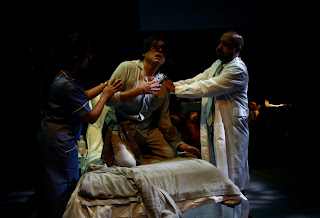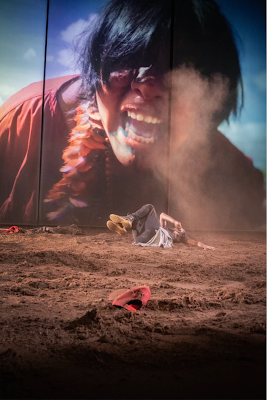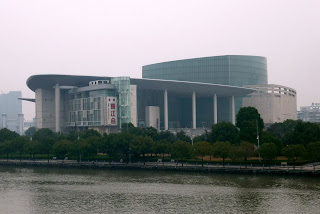 |
| Songstreets |
When I started to think about reviewing 2023, the logical first step was to look over what I'd written last December about 2022. That was the year when we issued THE SLIGO MANIFESTO, and my account of the year followed its structure, examining how we were moving towards those new ideas about what Border Crossings needs to do and to be in today's shifting world. Much of 2023 has been about laying the foundations for that emerging model.
The year began by consolidating and polishing the work we'd been creating in 2021-22, particularly the final stages in the prolonged and searching ORIGINS Festival we'd made through that time. BOTANY BAY may officially have ended a year ago, but the process of working through what that huge project had actually achieved was in itself a major undertaking, and it wasn't until the start of March that we published Carolyn Defrin's reflective post on this blog. SONGSTREETS, which we'd also been developing through ORIGINS, was launched in the Spring, and remains available to download and experience. It's one of our most exciting ventures yet in digital performance - Thor McIntyre-Burnie's sound world shifts the experience of walking the streets of Brixton, animating them as Tony Cealy shares histories and dialogues with the locals, with the music brought out by Jessie Lloyd becoming manifest as the soundtrack to their lives. It's been fascinating to live with this work over the last few months, watching how the shifting seasons change the experience, how the cold day of the launch emphasised the challenges facing the community, while taking the walk in summer made it a story of resilience and celebration.
Early 2023 also saw the final phase of X-EUROPEAN: the project exploring Third Space methodologies in which Border Crossings (Ireland) was the theatrical collaborator. It was only days after we held our last project meeting in Aalen (Germany) that the city of Adana, home to our wonderful Turkish partners at Çukurova University, was hit by a devastating earthquake. İlke Şanlıer's deeply impassioned and pained guest blog post came in the immediate aftermath. Somehow, Adana has re-emerged as the vibrant, busy city it was before (although its neighbour Antakya remains a site of devastation): we are now working closely with İlke and her colleagues on SUPPLIANTS OF SYRIA, which promises to be the first of our theatrical creations fully to embody the principles and ideas outlined in THE SLIGO MANIFESTO. We undertook the first phase of development in Turkey during November, and are hugely excited to be starting work with British and Irish actors in January. The next week or so will also tell us whether or not we've been successful in a large funding bid which would enable a second 2024 project - one that would reach performance in the autumn...
 |
| Filming for SUPPLIANTS OF SYRIA |
So there are definitely reasons to be hopeful as we begin the New Year, though at the same time the great crises facing the world seem to be coming into sharper, more intense and horrific focus than ever before. Cop 28 has ended with an agreement to phase out fossil fuels, and yet the president of the summit himself intends to continue investing at record levels in the production of gas and oil. The war in Ukraine is heading towards its third year, while in Gaza there are unprecedented levels of civilian and child casualties. In the UK, the government remains determined to send asylum seekers to Rwanda, despite the Supreme Court having ruled that this is illegal; and in Ireland we have seen the radical right unleashed on the streets of Dublin in a frenzy of racially motivated violence.
We need the arts. We need our cultures. We need spaces of exchange, depth and emotional sharing; spaces where, in the face of the reductive, shallow sloganeering that passes for a public discourse, we can encounter one another in the fullness of our common humanity.
Lucy and I experienced this very deeply during our November in Adana, where we worked with Syrian women on our new theatre and film project, SUPPLIANTS OF SYRIA. We heard stories of horror, and stories of tenderness. We saw tears, and we heard laughter. While we were there, we also had the privilege to present an online reading of THE GAZA MONOLOGUES, created by our partners in Ramallah, ASHTAR Theatre. In these moving stories, written by young people in the aftermath of a previous conflict, we again recognised the vulnerability that makes people loveable, the simple presence that makes them dear.
As we move into the New Year, it is in cultural spaces like these that we retain our hope to turn the page of history.











.png)












